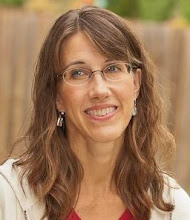I ended with the question: But who needs all these extra-biblical rituals?
I said the answer may be surprising; and it is--all of us!
Think of a wedding ceremony. It is full of meaningful symbols--the bride's white gown, her veil, the flowers, the rings, the unity candle, the choice of music, the vows, the pronouncement. They hit us somewhere below the brain--closer to the heart--with their underlying significance, often moving us to tears. These symbols reference a wondrous past and a hopeful future, captured in a present moment. And as Christians, we can't help but be aware of something mystical happening in a ceremony that turns two into one.
We celebrate birthdays, graduations, and holidays with traditional rituals and ceremonies. Ancient cultures celebrated and worshipped in the same way, with ritualistic ceremonies, sacrifices and partying. Ritual and ceremony is common to humanity across cultures and across time...so why is it so frequently ignored in the American church?
From To Dance With God (by Gertrud M. Nelson):
"Remember, we are a marvelously human lot, and our feeling and passion was never meant to be checked at the church doors. If sports can bring thousands to shouting and waving flags and banners, what is it about our church-related rituals that make so many reticent and self-conscious? Liturgy is exactly concerned with what is most human about us. Theology and history do not tell us everything we need to know about religion. Beyond the rational, ritual and symbol allow us to risk powerful feeling expressions within the safety of a discipline or form.... Yes, we risk putting ourselves out. But to hold back or deny out of fear is to deny people a form to contain their human expression; it is to rob people of a religious life."
"Beyond the rational" sums up that extra something--the mysterious, the supernatural--that needs to be present in the worship of a supernatural God. Through ritual and ceremony, we express the inexpressible, acknowledge the unexplainable.
I was struck a few weeks ago by the meditations of this blogger--quoted by this one--after hearing Ted Tripp speak at a conference (so I don't really know if these are her ideas or Ted's):
Our children are worshipers, he said, they were born to worship. ...Our craving for pleasure can be satisfied in a hunger for the Lord...Help your children to feast and delight in the Lord. He said a shrunken God will not be one before whom they will tremble and obey with reverence. What he said that hits me the most was that *our* joy, our life, our treasure must be in Christ. We must be driven by joy. I must have the beauty of God, the glory of God, before my eyes and heart. We must be dazzled by God to dazzle our children.
"...a shrunken God will not be one before whom they will tremble and obey with reverence." This phrase has stuck with me. How often--in our thinking, in our writing, in our worship--do we shrink God down to the understandable, the explainable, the convenient, the neat theological box.
By contrast, sacramental, liturgical worship is exceedingly comfortable with mystery. It is filled with layer upon layer of meaning and symbol, all designed to highlight the holiness, the dazzling spendor, the beautiful, glorious presence of God--and our transformed identities because of Him.
Such a service is not readily understandable to all. It is certainly not convenient. It takes longer than most worshipers are used to, and it requires more effort--standing, sitting, kneeling, leaving their seats for communion, following along to respond at appropriate times. "Liturgy" means "the work of the people" and it demands participation!
Yet it is pure joy to participate in the celebration of our life in Christ. What better way than by participation do we teach our children "to feast and delight in the Lord."
Next time: C.S. Lewis on ritual and solemn celebration.

No comments:
Post a Comment